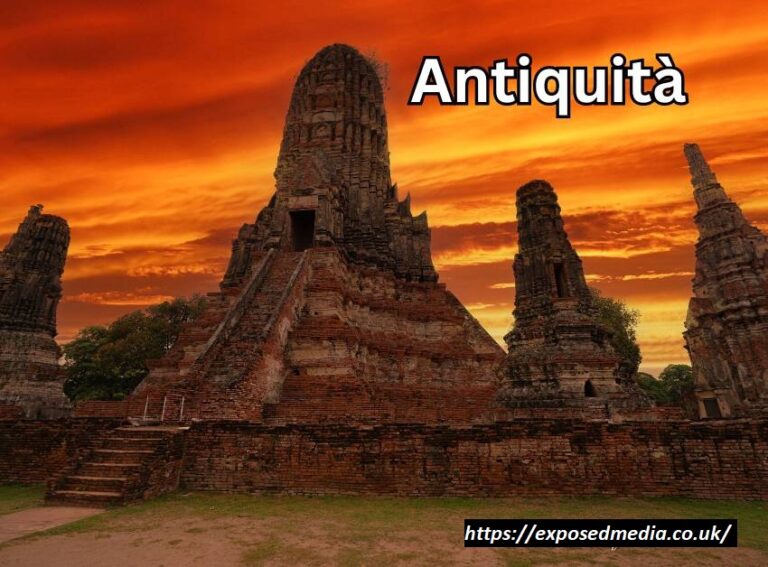Antiquità, the large expanse of history earlier than the Middle Ages, is a duration that laid the foundation for current civilization. Spanning from the earliest recorded human history to the autumn of the Roman Empire within the fifth century AD, this era witnessed the upward push and fall of first-rate civilizations, splendid advancements in arts and sciences, and the improvement of philosophical and non secular idea that keeps to influence the arena nowadays. In this exploration of antiquità, we delve into the key civilizations, their contributions, and the lasting legacies they left behind.
The Cradle of Civilization: Mesopotamia and Egypt
The fertile crescent of Mesopotamia, positioned among the Tigris and Euphrates rivers, is regularly referred to as the cradle of civilization. It turned into right here, around 3500 BC, that the Sumerians hooked up one of the first complex societies. The Sumerians are credited with numerous improvements, consisting of the invention of writing (cuneiform), the wheel, and the improvement of the first cities. Their felony codes, which includes the Code of Ur-Nammu and later the Code of Hammurabi from the Babylonian Empire, laid the foundation for modern prison structures.
Parallel to the trends in Mesopotamia, the historic Egyptians were constructing a civilization alongside the Nile River. The Egyptians are renowned for their huge structure, including the pyramids of Giza and the temples of Karnak and Luxor. Their advancements in mathematics, medicinal drug, and engineering have been amazing. The exercise of mummification and the precise know-how of human anatomy it required are specifically noteworthy. Egyptian art and hieroglyphics provide a wealthy visible and written report of their culture and beliefs.
The Dawn of Philosophy: Ancient Greece
Moving westward, ancient Greece is perhaps the maximum celebrated civilization of antiquità for its profound contributions to philosophy, science, and the humanities. The Greek town-states, specifically Athens, have been hotbeds of intellectual activity. Figures like Socrates, Plato, and Aristotle laid the philosophical foundations that might form Western idea for millennia. Socratic questioning, Platonic beliefs, and Aristotelian logic stay crucial to trendy philosophy and schooling.
In addition to philosophy, the Greeks made giant strides in mathematics and science. Pythagoras, Euclid, and Archimedes are just a few of the mathematicians whose work is still fundamental. Greek advances in astronomy, including the heliocentric model proposed by Aristarchus, prefigured later medical discoveries.
Greek subculture additionally celebrated human achievement via the arts and literature. Epic poets like Homer, playwrights consisting of Sophocles and Euripides, and historians like Herodotus and Thucydides have left an indelible mark on global literature. The classical ideals of beauty and percentage expressed in Greek sculpture and architecture encouraged artwork for hundreds of years.
The Might of Rome
The rise of Rome marked the culmination of historic civilization and its transformation into a complicated empire that might dominate the Mediterranean world for centuries. Founded in 753 BC, Rome grew from a small metropolis-kingdom to a widespread empire encompassing a good deal of Europe, North Africa, and the Near East. The Roman Republic, and later the Roman Empire, implemented a machine of presidency that has inspired political idea and establishments at some point of records.
Roman law, codified within the Twelve Tables and later in Justinian’s Corpus Juris Civilis, shaped the basis of criminal structures in many cutting-edge countries. The Romans were additionally grasp builders and engineers, developing enduring systems which includes aqueducts, roads, and the Colosseum. Their improvements in construction, along with the use of concrete, enabled the advent of full-size, durable public works.
Culturally, Rome was a melting pot, soaking up and adapting the influences of the civilizations it conquered, specifically Greece. Roman literature, artwork, and architecture had been closely influenced by Greek models, but they advanced their personal wonderful patterns. The Roman poet Virgil, as an example, drew idea from Homer but created an epic uniquely desirable to Roman ideals in the Aeneid.
The Far East: China and India
While the Mediterranean civilizations frequently dominate discussions of antiquità, good sized traits were additionally taking place within the Far East. Ancient China, underneath numerous dynasties, made exceptional contributions to human civilization. The Shang Dynasty (c. 1600–1046 BC) saw the development of Chinese writing, bronze casting, and the earliest varieties of Chinese non secular practice.
The Zhou Dynasty (1046–256 BC) delivered the idea of the Mandate of Heaven, a political concept that justified the ruler’s authority as divinely sanctioned. This duration also saw the flowering of Chinese philosophy, with Confucianism and Daoism supplying profound insights into ethics, governance, and the herbal global. The Qin Dynasty (221–206 BC) unified China, standardizing writing, currency, and measurements, and initiated the construction of the Great Wall.
In the Indian subcontinent, the Indus Valley Civilization (c. 3300–1300 BC) changed into one of the international’s earliest city cultures, regarded for its superior metropolis making plans and complicated drainage systems. Later, the Vedic length (c. 1500–500 BC) laid the rules for Hinduism and the social shape that could shape Indian society for millennia.
The Maurya (c. 322–185 BC) and Gupta (c. 320–550 AD) Empires constitute excessive points in ancient Indian history. Under Ashoka the Great, the Mauryan Empire embraced Buddhism and unfold its teachings across Asia. The Gupta period is often referred to as a golden age of Indian lifestyle, marked by means of achievements in science, mathematics, astronomy, and literature.
The Legacies of Antiquità
The legacies of antiquità are manifold and deeply embedded in the fabric of modern society. The political ideas of democracy and republicanism, first practiced in Athens and Rome, maintain to shape present day governance. The philosophical inquiries of the Greeks laid the groundwork for Western intellectual culture, even as Roman regulation remains the inspiration of felony structures in many nations.
Advancements in science and era from ancient civilizations laid the cornerstones for modern disciplines. The mathematical standards advanced via the Greeks and Indians, the engineering feats of the Romans, and the astronomical observations of the Chinese are crucial to the development we see nowadays.
Culturally, the artistic and literary achievements of antiquità continue to inspire. The epics of Homer, the tragedies of Sophocles, and the poetry of Virgil continue to be critical to the literary canon. The architectural marvels of ancient Egypt, Greece, and Rome nevertheless stand as testaments to human ingenuity and aesthetic sensibility.
Conclusion
Antiquità became a time of big human achievement and innovation. The civilizations that rose and fell at some stage in this era laid the principles for lots aspects of modern existence. From the legal structures and political systems to scientific principles and cultural expressions, the contributions of historical societies maintain to resonate these days. As we look returned at antiquità, we benefit a deeper appreciation for the iconic legacy of our ancestors and the awesome human journey via time.


